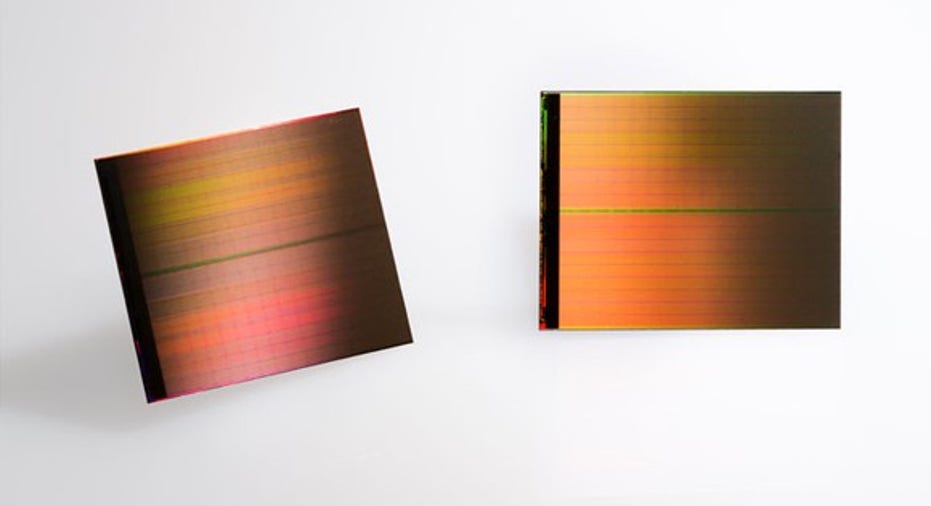Intel Corporation Expects to Profit From Memory Business

Intel (NASDAQ: INTC) is largely known for its world-class microprocessors. These chips primarily power the bulk of the world's personal computers and data centers, and those processors are increasingly found in new devices, such as cars.
3D XPoint chips. Image source: Intel.
However, the company has signaled for quite a while that it has ambitions to participate aggressively in the market for non-volatile memory technologies, which includes NAND flash and its upcoming 3D XPoint memory.
Over the last nine months, Intel's non-volatile memory business generated $1.76 billion in revenue, down from $1.94 billion in the first nine months of last year. It has also racked up a $453 million operating loss from these efforts, a dramatic reversal of fortune from the modest $215 million in operating profit that the business generated in the first nine months of 2015.
At a recent investor conference,Intel executive Stacy Smith provided some additional insight into Intel's longer-term goals in this business.
Why have profits dropped?
Smith provided a very helpful explanation for why Intel's profitability in non-volatile memory dropped so precipitously this year.
He first blamed the overall non-volatile memory market in general, saying that it's "the bad part of the cycle for memory in general."
The deterioration in the financial performance of Intel's non-volatile memory business, Smith said, is partially due to industrywide NAND flash prices simply coming down.
However, the executive made clear that this was far from the only -- or largest -- factor behind that decline.
Smith pointed to the fact that Intel is currently incurring start-up costs as it brings its memory factory in Dalian, China, into mass production as negatively impacting profitability. He also said that the company is "still making significant [research and development] investments" in an upcoming memory technology known as 3D XPoint.
As far as the losses go, Smith says that this is a "temporary phenomenon" and that the company "fully expect[s] that [Intel is] going to make very good money in that space."
How about gross profit margin?
Analyst John Pitzer asked Smith if Intel's memory business will, "over a five-year period," generate a gross profit margin percentage like Intel's current average gross profit margin percentage.
Smith said that it is "highly unlikely" that Intel's memory business could generate such margin, noting that "it's memory at the end of the day."
"I think we'll make good margins; we'll make better-than-industry margins, but it's not likely to do the same margin as a Xeon processor," Smith elaborated.
Nevertheless, Smith made clear that not all the businesses that Intel participates in need to generate such high margin.
"We're not trying to truncate growth in certain segments to hit a corporate average," Smith said. "What we want is that every business is growing, every business is expanding its operating margin."
Smith offered additional insights, arguing that "if some business is growing faster than others and is causing the average [margin] to go down, that's OK, because we're generating more cash, we're generating more return for [Intel's] shareholders."
Investor takeaway
Intel's memory business is likely to lose significantly more than $500 million this year, which is a nontrivial drag on the company's overall operating profit. If it can wipe out the loss and return even to modest profitability here, then that could mean a solid boost to Intel's earnings and potentially its stock price.
Intel is likely to reveal more about the financial trajectory of this business at its upcoming investor meeting in early February.
10 stocks we like better than Intel When investing geniuses David and Tom Gardner have a stock tip, it can pay to listen. After all, the newsletter they have run for over a decade, Motley Fool Stock Advisor, has tripled the market.*
David and Tom just revealed what they believe are the 10 best stocks for investors to buy right now... and Intel wasn't one of them! That's right -- they think these 10 stocks are even better buys.
Click here to learn about these picks!
*Stock Advisor returns as of November 7, 2016
Ashraf Eassa owns shares of Intel. The Motley Fool recommends Intel. Try any of our Foolish newsletter services free for 30 days. We Fools may not all hold the same opinions, but we all believe that considering a diverse range of insights makes us better investors. The Motley Fool has a disclosure policy.



















